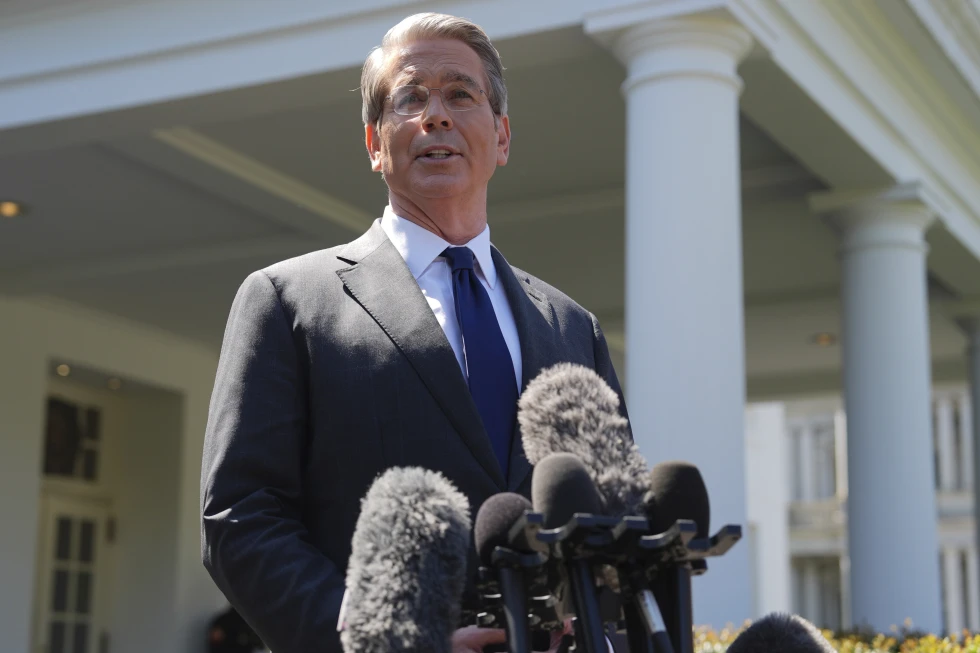WASHINGTON — U.S. Treasury Secretary Scott Bessent warned Tuesday that the ongoing trade war between the United States and China is “not sustainable,” signaling a possible shift in Washington’s tough stance on tariffs under President Donald Trump’s administration.

Speaking in a closed-door address to executives at JPMorgan Chase in Washington, Bessent suggested that while no formal negotiations with China have begun, both sides recognize that the current tariff standoff cannot continue indefinitely.
“I do say China is going to be a slog in terms of the negotiations,” Bessent said, according to a transcript obtained by The Associated Press. “Neither side thinks the status quo is sustainable.”
Bessent’s remarks, confirmed by two individuals familiar with the speech who spoke on the condition of anonymity, come amid escalating economic tensions between the world’s two largest economies. President Trump has imposed sweeping tariffs of up to 145% on Chinese imports, prompting Beijing to retaliate with 125% tariffs on American goods.
Following initial reports from Bloomberg News detailing Bessent’s comments, the S&P 500 stock index climbed, as investors interpreted the remarks as a sign of potential easing in one of the most volatile fronts in U.S. foreign policy.
Despite growing concerns from business leaders and economists, Trump has shown no public intention of removing his baseline 10% tariffs, which apply to dozens of countries beyond China, including U.S. allies such as Japan, Canada, the European Union, and Mexico.
Trump administration officials maintain that the aggressive tariff strategy is part of a broader push to eliminate trade barriers and boost American exports. White House Press Secretary Karoline Leavitt told reporters Tuesday that the president expressed optimism about a potential deal with China.
“President Trump told me directly, ‘We’re doing very well’ regarding a potential trade deal with China,” Leavitt said during a briefing.
However, Bessent’s behind-the-scenes remarks suggest growing internal recognition that prolonged tariffs could damage the U.S. economy, contributing to higher inflation, increased borrowing costs, and mounting uncertainty in financial markets.
China’s Ministry of Commerce issued a sharp warning Monday to countries considering new trade agreements with Washington, saying Beijing would firmly oppose any deal that undermines its interests.
“China firmly opposes any party reaching a deal at the expense of China’s interests,” the ministry said in a statement.
That message comes as the Trump administration claims it has received 18 formal trade proposals from foreign governments looking to negotiate bilateral agreements with the United States. While the White House is touting that interest as a win, trade experts note that many countries remain wary of making long-term commitments amid volatile U.S. policy shifts.
The trade war’s effects are also reverberating through monetary policy. President Trump has publicly criticized the Federal Reserve for maintaining its benchmark interest rate, arguing that a rate cut is necessary to offset tariff-related economic pressures.
Trump has even suggested he could fire Fed Chair Jerome Powell, though such a move would break longstanding precedent and raise legal questions.
Leavitt reiterated the president’s frustration, stating, “The Fed is holding rates steady in the name of politics, rather than what’s right for the American economy.”
Despite Bessent’s calls for de-escalation, no official U.S.-China trade talks have been scheduled. The Treasury secretary acknowledged that negotiations with Beijing would likely be protracted and complex.
Still, his assessment marked one of the clearest signals yet from within the Trump administration that the current hardline trade stance may need to evolve.



